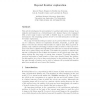Free Online Productivity Tools
i2Speak
i2Symbol
i2OCR
iTex2Img
iWeb2Print
iWeb2Shot
i2Type
iPdf2Split
iPdf2Merge
i2Bopomofo
i2Arabic
i2Style
i2Image
i2PDF
iLatex2Rtf
Sci2ools
112
Voted
ROBOCUP
2007
Springer
2007
Springer
Beyond Frontier Exploration
This article investigates the prerequisites for a global exploration strategy in an unknown environment on a virtual disaster site. Assume that a robot equipped with a laser range scanner can build a detailed map of a previous unknown environment. The remaining question is how to use this information on this map for further exploration. On a map several interesting locations can be present where the exploration can be continued, referred as exploration frontiers. Typically, a greedy algorithm is used for the decision which frontier to explore next. Such a greedy algorithm only considers interesting locations locally, focused to reduce the movement costs. More sophisticated algorithms also take into account the information that can be gained along each frontier. This shifts the problem to estimate the amount of unexplored area behind the frontiers on the global map. Our algorithm exploits the long range of current laser scanners. Typically, during the previous exploration a small numbe...
Related Content
| Added | 09 Jun 2010 |
| Updated | 09 Jun 2010 |
| Type | Conference |
| Year | 2007 |
| Where | ROBOCUP |
| Authors | Arnoud Visser, Xingrui-Ji, Merlijn van Ittersum, Luis A. González Jaime, Laurentiu A. Stancu |
Comments (0)

